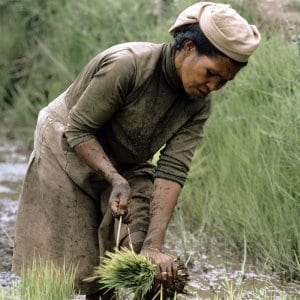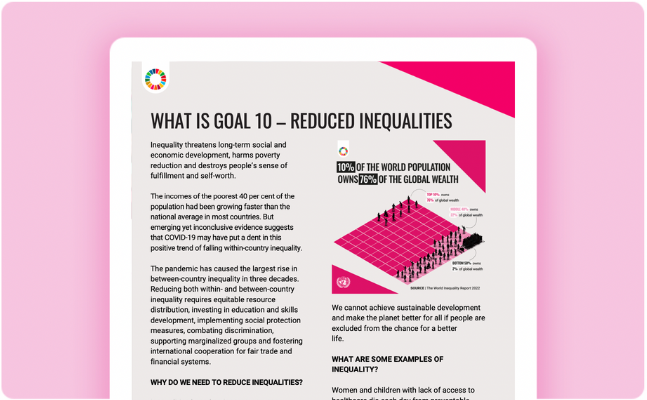Inequality threatens long-term social and economic development, harms poverty reduction and destroys people’s sense of fulfillment and self-worth.
The incomes of the poorest 40 per cent of the population had been growing faster than the national average in most countries. But emerging yet inconclusive evidence suggests that COVID-19 may have put a dent in this positive trend of falling within-country inequality.
The pandemic has caused the largest rise in between-country inequality in three decades. Reducing both within- and between-country inequality requires equitable resource distribution, investing in education and skills development, implementing social protection measures, combating discrimination, supporting marginalized groups and fostering international cooperation for fair trade and financial systems.
Why do we need to reduce inequalities?
Inequalities based on income, sex, age, disability, sexual orientation, race, class, ethnicity, religion and opportunity continue to persist across the world. Inequality threatens long-term social and economic development, harms poverty reduction and destroys people’s sense of fulfillment and self-worth. This, in turn, can breed crime, disease and environmental degradation.
We cannot achieve sustainable development and make the planet better for all if people are excluded from the chance for a better life.
What are some examples of inequality?
Women and children with lack of access to healthcare die each day from preventable diseases such as measles and tuberculosis or in childbirth. Older persons, migrants and refugees face lack of opportunities and discrimination – an issue that affects every country in the world. One in five persons reported being discriminated on at least one ground of discrimination prohibited by international human rights law.
One in six people worldwide has experienced discrimination in some form, with women and people with disabilities disproportionately affected.
Discrimination has many intersecting forms, from religion, ethnicity to gender and sexual preference, pointing to the urgent need for measures to tackle any kind of discriminatory practices and hate speech.
How do we tackle discrimination?
In today’s world, we are all interconnected. Problems and challenges like poverty, climate change, migration or economic crises are never just confined to one country or region. Even the richest countries still have communities living in abject poverty. The oldest democracies still wrestle with racism, homophobia and transphobia, and religious intolerance. Global inequality affects us all, no matter who we are or where we are from.
Can we achieve equality for everyone?
It can – and should be – achieved to ensure a life of dignity for all. Political, economic and social policies need to be universal and pay particular attention to the needs of disadvantaged and marginalized communities.
What can we do?
Reducing inequality requires transformative change. Greater efforts are needed to eradicate extreme poverty and hunger, and invest more in health, education, social protection and decent jobs especially for young people, migrants and refugees and other vulnerable communities.
Within countries, it is important to empower and promote inclusive social and economic growth. We can ensure equal opportunity and reduce inequalities of income if we eliminate discriminatory laws, policies and practices.
Among countries, we need to ensure that developing countries are better represented in decision-making on global issues so that solutions can be more effective, credible and accountable.
Governments and other stakeholders can also promote safe, regular and responsible migration, including through planned and well-managed policies, for the millions of people who have left their homes seeking better lives due to war, discrimination, poverty, lack of opportunity and other drivers of migration.

- The incomes of the poorest 40 per cent of the population had been growing faster than the national average in most countries. But emerging yet inconclusive evidence suggests that COVID-19 may have put a dent in this positive trend of falling within-country inequality. The pandemic has also caused the largest rise in between-country inequality in three decades.
- One in six people worldwide has experienced discrimination in some form, with women and people with disabilities disproportionately affected.
- The year 2022 witnessed the highest number of refugees (34.6 million people) ever documented. This year is also a deadly one for migrants, with nearly 7,000 deaths recorded globally.
- Reducing both within- and between-country inequality requires equitable resource distribution, investing in education and skills development, implementing social protection measures, combating discrimination, supporting marginalized groups and fostering international cooperation for fair trade and financial systems.
10.1 By 2030, progressively achieve and sustain income growth of the bottom 40 per cent of the population at a rate higher than the national average
10.2 By 2030, empower and promote the social, economic and political inclusion of all, irrespective of age, sex, disability, race, ethnicity, origin, religion or economic or other status
10.3 Ensure equal opportunity and reduce inequalities of outcome, including by eliminating discriminatory laws, policies and practices and promoting appropriate legislation, policies and action in this regard
10.4 Adopt policies, especially fiscal, wage and social protection policies, and progressively achieve greater equality
10.5 Improve the regulation and monitoring of global financial markets and institutions and strengthen the implementation of such regulations
10.6 Ensure enhanced representation and voice for developing countries in decision-making in global international economic and financial institutions in order to deliver more effective, credible, accountable and legitimate institutions
10.7 Facilitate orderly, safe, regular and responsible migration and mobility of people, including through the implementation of planned and well-managed migration policies
10.A Implement the principle of special and differential treatment for developing countries, in particular least developed countries, in accordance with World Trade Organization agreements
10.B Encourage official development assistance and financial flows, including foreign direct investment, to States where the need is greatest, in particular least developed countries, African countries, small island developing States and landlocked developing countries, in accordance with their national plans and programmes
10.C By 2030, reduce to less than 3 per cent the transaction costs of migrant remittances and eliminate remittance corridors with costs higher than 5 per cent
Related News
United Nations conference in Riyadh charts a path for global action on land, drought
After two weeks of intense negotiations on how to tackle land degradation, desertification and drought, the largest and most inclusive United Nations land conference wrapped up in Riyadh, Saudi Arabia.
Underinvestment threatens universal health coverage goals
Coinciding with Universal Health Coverage Day on Thursday the World Health Organization (WHO) released its 2024 Global Health Expenditure Report, revealing troubling declines in government health spending. Read Full Story on UN News
Six bold environmental leaders named 2024 Champions of the Earth
Brazil’s first-ever Minister of Indigenous Peoples and an initiative promoting sustainable agriculture in Egypt are among the six recipients of the 2024 Champions of the Earth award, announced by the UN Environment Programme (UNEP) in [...]





